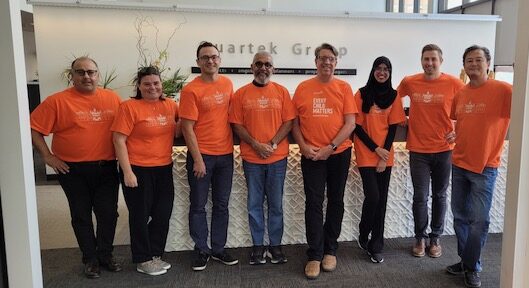Every year, September 30 is observed as the National Day for Truth and Reconciliation.
This significant day pays tribute to the children who never returned from residential schools, as well as the Survivors, their families, and communities. Recognizing the sorrowful history and the ongoing repercussions of these schools through public commemoration is essential for the reconciliation journey.
Coinciding with this day is Orange Shirt Day, an Indigenous-led grassroots initiative. It aims to highlight the inter-generational effects of residential schools on individuals, families, and communities while promoting the message that “Every Child Matters.” The orange shirt symbolizes the loss of culture, freedom, and self-worth endured by Indigenous children over generations.
On September 30, Quartek wears orange to honour the countless Survivors of residential schools.
More Ways to Commemorate and Participate
Participating in the National Day for Truth and Reconciliation and Orange Shirt Day offers an opportunity for reflection, learning, and taking meaningful action. Here are several ways to honour this day:
1. Wear Orange: Wearing an orange shirt on September 30 is a powerful gesture that shows solidarity with Indigenous communities and acknowledges the experiences of residential school Survivors.
2. Educate Yourself and Others: Invest time in learning about the history and impact of residential schools on Indigenous peoples. Sharing this knowledge can raise awareness and foster understanding within your community.
3. Attend Events and Ceremonies: Join local events, workshops, and ceremonies to commemorate the day. These activities provide a platform to hear Survivors’ stories and engage in important discussions about reconciliation.
4. Support Indigenous-Led Initiatives: Contribute to organizations and projects focused on healing and supporting Indigenous communities. Donations, volunteering, or advocacy can make a significant impact.
5. Reflect and Advocate: Use this day to consider how you can support reconciliation efforts. Advocate for policies and practices that promote equality and justice for Indigenous peoples.
By engaging in these activities, Canadians can support Survivors and their communities, and help create a more inclusive and reconciled future.



